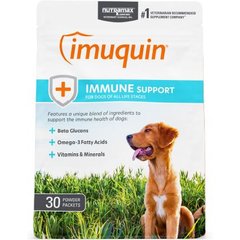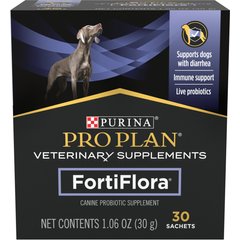Understanding How Probiotics for Dogs Work
Here’s a fun fact: A mammal’s intestinal tract contains approximately 10 times more microbes than the number of cells in the rest of their body. This is likely true for dogs, cats, and even people. Is it any wonder why the intestinal microbiome’s role in our health is the focus of such intense research?
Nutritional supplements that contain probiotics and prebiotics are popular ways to support a healthy microbiome. Let’s take a look at some common pre- and probiotics and what they do inside a dog’s body.
Probiotics for Dogs
Probiotics for dogs are nutritional supplements containing beneficial living microorganisms that are normally found in the gastrointestinal tract. While we don’t know exactly what each microorganism does, most probiotics for dogs are designed primarily to support digestive health. But they can have other effects as well.
Lactobacillus
Lactobacillus bacteria are included in many probiotics meant to support intestinal health. They may help restore the intestinal microbiome after imbalances that have occurred due to dietary changes, antibiotic use, or stressful events like boarding or traveling. This can improve a dog’s appetite and get rid of diarrhea.
Because so much of a dog’s immune system is located in the intestinal tract, Lactobacillus bacteria are also given to support a healthy overall immune response. Lactobacillus species to look for include:
-
Lactobacillus acidophilus
-
Lactobacillus plantarum
-
Lactobacillus casei
-
Lactobacillus brevis
-
Lactobacillus bulgaricus
Vet Recommended Health Support
- Nutramax Imuquin Immune Support Powder Immune Supplement for Dogs, 30 count$24.99Chewy Price
- Purina Pro Plan Veterinary Diets FortiFlora Powder Probiotic Digestive Supplement for Dogs, 30 count$30.99Chewy Price
- Purina Pro Plan Adult Sensitive Skin & Stomach Salmon & Rice Formula Dry Dog Food, 16-lb bag$54.48Chewy Price
- Virbac Epi-Otic Advanced Ear Cleaner for Dogs & Cats, 4-fl oz bottle$13.19Chewy Price
Enterococcus and Bacillus
In the gut, Enterococcus and Bacillus bacteria are thought to have many of the same effects as Lactobacillus, including supporting a dog’s intestinal health and overall immune function and helping to resolve or prevent diarrhea. Species that are commonly included in probiotics include:
-
Enterococcus faecium
-
Enterococcus thermophilus
-
Bacillus coagulans
Bifidobacterium
Certain species of Bifidobacterium bacteria are also included in the many probiotic supplements that are designed to support a healthy intestinal tract and immune system. These include:
-
Bifidobacterium bifidum
-
Bifidobacterium animalis
But another Bifidobacterium has been shown to help dogs stay calm in situations that normally trigger anxious behaviors. Calming probiotics contain a special type of Bifidobacterium longum that goes by the proprietary name BL999.
These are not the only uses of probiotics in dogs. Studies show that changing the intestinal microbiome “may impact not only GI disease, but also allergies, oral health, weight management, diabetes, and kidney disease.”
Prebiotics for Dogs
Another way to alter a dog’s intestinal microbiome is to preferentially “feed” the beneficial microorganisms that are in the gut (or that we’re adding with probiotic supplements). If we create a good environment for them, these microorganisms should be able to reproduce and increase their own numbers.
Prebiotics are nutrients that promote the growth of beneficial gut microbes. They are a type of fiber that gut bacteria can use as an energy source. Look for any of the following on a nutritional supplement’s label to determine if it includes prebiotics:
-
Fructooligosaccharides
-
Gum arabic
-
Arabinogalactan
-
Inulin
-
Beet pulp
-
Chicory
Talk to your veterinarian if you think your dog could benefit from probiotics or prebiotics. They can point you toward the products that are most likely to help based on your dog’s particular needs.
Featured Image: iStock/Kosamtu




